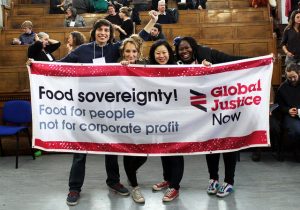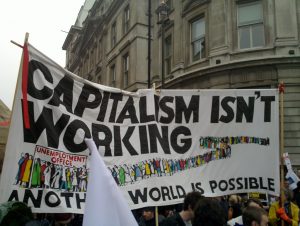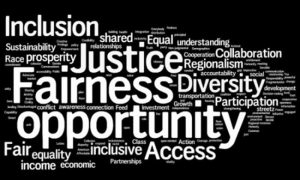“Food sovereignty is, if anything, over defined. There are so many versions of the concept, it is hard to know exactly what it means. The proliferation of overlapping definitions is, however, a symptom of food sovereignty itself, woven into the fabric of food sovereignty by necessity.” – Raj Patel
“You can be food secure in prison,” says a member of our lab group as we discuss food sovereignty. Referring to Arthur Manuel’s book Unsettling Canada, Manuel talks about his experience of being in jail and juxtaposing this experience to that of being incarcerated in residential school. He talks about how bad the food was in residential school and that this led to his first political act, a strike over the food where meat and vegetables were extremely rare.
In prison, and prison-like situations, access to food is likely a limited concern, the State will feed you. What remains uncertain is what say a prisoner might have and whether this food meets your cultural or spiritual needs, whether it is produced in ecological ways that sustain the planet, and whether the people working to grow and distribute this food are treated fairly. This quote by Manuel in some ways talks about power and the need to dissent in the face of injustice. For many people across the globe, your right to choose, to self-determination has been taken away. You, prisoner #103562, are powerless.
Our Food Sovereignty Lab, based in the Centre for Sustainable Food Systems at UBC, met for our year-end celebration and to share and discuss our ideas of what is meant by the term ‘food sovereignty’. As many people do, we had a strong impulse to define, to seek out the ways in which others have given voice to similar thoughts and concepts (side note: I am often amazed at the ability of others to put my thoughts and feelings into words). We then took on the rigorous task of tweaking the most often-used definition of food sovereignty, so that it included the nuances and aspects most important to us and our fields of study.
As a group working on different aspects of food sovereignty, we felt that it was important to talk about the different meanings attributed to this concept. Although this discussion was not intended to create an agreed-upon definition of food sovereignty; it allowed our group to identify whatever elements they thought comprised the concept of ‘food sovereignty’ while also identifying the elements that are contrary to the idea[1]. While the approach of juxtaposing a term in this way may present a binary, or an exclusion, it is precisely this approach that serves to add richness to a concept by creating artificial (or semantic) boundaries that represent the edges where dialogue can occur.
1) What is Food Sovereignty?
Our lab members come from a wide variety of backgrounds and work all over the world. Each of us brought a different perspective, however, some common elements emerged — particularly around notions of self-determination, autonomy and democratic and collective approaches to foodlands and decision-making. These ideas were strongly linked to democracy, and to governments and states protecting the rights of individuals, communities, and the land.

For many, the discussion of democracy, rights, state responsibility, led to the identification of elements of resistance, anti-capitalism, empowerment, transformation, anti-dispossession, collective action, social struggle against injustices, decolonization, and calls for deep/radical changes to how we think and relate to the land and to each other. This change was seen as being achieved by resisting and reconciling current and historical oppression and violence, including more equitable and sustainable food production and trade. In addition, members identified a need to address the psycho-cultural domination inherent in neoliberal consumption and materialism. That is, the pervasive world views that legitimize and render invisible the oppressive and exploitative practices and structures of capitalist food systems.
We discussed a number of oppositional statements, framed as real or perceived tensions, such as: the individual vs the farmer, sovereignty vs self-determination, goal vs process, states/corporations vs citizens/peasants/(farm)workers, rural vs urban, and relationships/connectivity vs liberalism. While these discussions were left unresolved and many of these tensions weren’t seen as mutually exclusive, it served as a platform for a rich discussion around critical questions. For example, we saw food sovereignty as a precondition for food security to exist in that individuals, households, and communities should have the power and autonomy to determine how food is grown, shared and returned to the earth.
Throughout the conversation, we acknowledged the importance of identifying and recognizing the role of power in defining and describing food sovereignty. For many, power struggles and the shifting base of power is deeply related to – or even underpins – the achievement of food sovereignty. We shared a common notion that redressing unequal power relations was integral to food sovereignty discourse and practice.
2) What Isn’t Food Sovereignty?

For many, food sovereignty could not be achieved through capitalism or neoliberalism. It was not viewed as something that could easily be reduced or simplified (e.g. a minimum dietary intake of macro/micronutrients, access to food retail), ‘silver bullets’ or ‘one-size fits-all’ approaches fail to encompass the complexity inherent in food sovereignty.
Interestingly, while we all identified elements/indicators of food sovereignty, we generally agreed that it was not an ‘end-state.’ For many, it was seen to be dynamic, in flux, emergent — a process, rather than a goal.
Personal Reflections
Facilitating this activity with colleagues and friends opened my eyes and broadened my conceptual understanding of food sovereignty. In my own work, I’m curious about the push towards cosmopolitan/multicultural cities in the 21st century and wonder how culturally and linguistically diverse farmers and citizens engage and think about food sovereignty. Being able to understand and discuss the application of food sovereignty in different places and times serves to enlighten and inspire my own work and, I think, the work of our team.

I encourage you, the reader, to engage your friends and colleagues in a similar activity. Feel free to get in touch and share your thoughts and your experience with trying to define food sovereignty. You can reach me at colind@mail.ubc.ca or through the comment section below.
We’ve also compiled a list of resources (articles, books, videos) for you to access and use. If you have any additional suggestions, please let us know and we will add them to the list.
Food Sovereignty Resources:
Websites:
La Via Campesina – https://viacampesina.org/en/
Indigenous Food Systems Network – Indigenous Food Sovereignty http://www.indigenousfoodsystems.org/food-sovereignty
Food Secure Canada – What is Food Sovereignty? – https://foodsecurecanada.org/who-we-are/what-food-sovereignty
Women’s Declaration on Food Sovereignty – https://nyeleni.org/spip.php?article310
Papers from Hague Food Sovereignty Conference https://www.iss.nl/research/research_programmes/political_economy_of_resources_environment_and_population_per/networks/critical_agrarian_studies_icas/food_sovereignty_a_critical_dialogue/
Panel and presentations given at the 2013 Food Sovereignty: A Critical Dialogue.
Videos
Hands on the Land for Food Sovereignty and Climate Justice
Food sovereignty: Valerie Segrest at TEDxRainier
Books:
Desmarais, A. A., & Wiebe, N. (2010). Food sovereignty: Reconnecting food, nature & community (pp. 1-12). H. Wittman (Ed.). Oxford: Pambazuka.
Desmarais, A. A., & Wiebe, N. (2011). Food sovereignty in Canada: creating just and sustainable food systems. H. Wittman (Ed.). Fernwood Pub.
Peer Reviewed and Scholarly Articles:
Aerni, P. (2011). Food Sovereignty and its Discontents. ATDF Journal, 8(1–2), 23–40.
Akram-Lodhi, A.H., & Minkoff-Zern, L.A. (2013). How to Build Food Sovereignty. In Food Sovereignty: A Critical Dialogue. New Haven, CT: Yale University.
Alkon, A. H., & Mares, T. M. (2012). Food sovereignty in US food movements: radical visions and neoliberal constraints. Agriculture and Human Values, 29(3), 347–359. http://doi.org/10.1007/s10460-012-9356-z
Alonso-Fradejas, A., Borras, S. M., Jr, Holmes, T., Holt-Giménez, E., & Robbins, M. J. (2015). Food sovereignty: convergence and contradictions, conditions and challenges. Third World Quarterly, 36(3), 431–448. http://doi.org/10.1080/01436597.2015.1023567
Altieri, M.A. (2009). Agroecology, Small Farms, and Food Sovereignty. Monthly Review 61(3). Retrieved November 15, 2015 from: http://monthlyreview.org/2009/07/01/agroecology-small-farms-and-food-sovereignty/
Andrée, P., Cobb, M., Moussa, L., & Norgang, E. (2011). Building Unlikely Alliances Around Food Sovereignty in Canada. Studies in Political Economy, 88, 133–159
Bartos, A. E. (2014). Discourses of food sovereignty from somewhere. Dialogues in Human Geography, 4(2), 190–194. http://doi.org/10.1177/2043820614537158
Borras, S. M., Jr, Franco, J. C., & Suárez, S. M. (2015). Land and food sovereignty. Third World Quarterly, 36(3), 600–617. http://doi.org/10.1080/01436597.2015.1029225
Burnett, K., & Murphy, S. (2014). What place for international trade in food sovereignty? The Journal of Peasant Studies, 0(0), 1–20. http://doi.org/10.1080/03066150.2013.876995
Carolan, M. (2014). Getting to the core of food security and food sovereignty: Relationality with limits? Dialogues in Human Geography, 4(2), 218–220. http://doi.org/10.1177/2043820614537164
Coté, C. (2014). Food Sovereignty, food hegemony, and the revitalization of indigenous whaling practices. The World of Indigenous North America, 239.
Edelman, M. (2014). The next stage of the food sovereignty debate. Dialogues in Human Geography, 4(2), 182–184. http://doi.org/10.1177/2043820614537153
Edelman, M. (2014). Food sovereignty: forgotten genealogies and future regulatory challenges. The Journal of Peasant Studies, 41(6), 959- 978. http://doi.org/10.1080/03066150.2013.876998
Edelman, M., Weis, T., Baviskar, A., Borras Jr, S.M., Holt-Giménez, E., Kandiyoti, D., & Wolford, W. (2014). Introduction: critical perspectives on food sovereignty. Journal of Peasant Studies, 41(6), 911–931.
Holt-Giménez, E. (2009). From food crisis to food sovereignty. Monthly Review, 61(3), 142–156.
Jarosz, L. (2014). Comparing food security and food sovereignty discourses. Dialogues in Human Geography, 4(2), 168–181. http://doi.org/10.1177/2043820614537161
McMichael, P. (2009). A Food Regime Genealogy. The Journal of Peasant Studies, 36(1), 139–169.
McMichael, P. (2014). Historicizing Food Sovereignty. The Journal of Peasant Studies, 41, 6, 933–957
Martínez-Torres, M. E., & Rosset, P. M. (2010). La Vía Campesina: the birth and evolution of a transnational social movement. Journal of Peasant Studies, 37(1), 149–175. http://doi.org/10.1080/03066150903498804
Patel, R. (2009). Food sovereignty. The Journal of Peasant Studies, 36(3), 663-706.
Pimbert, M. (2006). Transforming Knowledge and Ways of Knowing for Food Sovereignty. London: United Kingdom: International Institute for Environment and Development.
Pimbert, M. (2009). Towards food sovereignty. London, United Kingdom: International Institute for Environment and Development.
Rocha, C. (2008). Food Insecurity as Market Failure: A Contribution from Economics. Journal of Hunger & Environmental Nutrition, 1(4), 5–22. http://doi.org/10.1300/J477v01n04_02
Rosset, P. (2008). Food sovereignty and the contemporary food crisis. Development, 51(4), 460–463.
Schiavoni, C. (January 24, 2014). Competing Sovereignties in the Political Construction of Food Sovereignty (Conference Paper #90). Conference paper for discussion at Food Sovereignty: A Critical Dialogue, The Hague, The Netherlands.
Weiler, A. M., Hergesheimer, C., Brisbois, B., Wittman, H., Yassi, A., & Spiegel, J. M. (2015). Food sovereignty, food security and health equity: a meta-narrative mapping exercise. Health Policy and Planning, 30(8), 1078–1092.
Windfuhr, M. & Jonsén, J. (2005). Food Sovereignty: Towards Democracy in Localized Food Systems. Bourton-on-Dunsmore, UK: FIAN-International; ITDG Publishing.
[1] In this Globe and Mail article the author suggests that a carbon tax, in his opinion, would disrupt the ability of the Canadian agricultural sector to remain competitive across international markets. He demonstrates a different usage of the term food sovereignty to indicate that Canadian food sovereignty is linked to corporate success.
